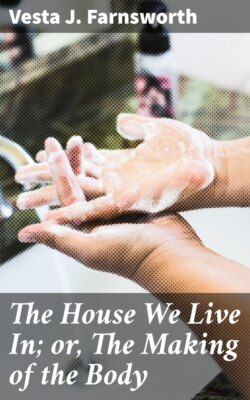Читать книгу The House We Live In; or, The Making of the Body - Vesta J. Farnsworth - Страница 5
На сайте Литреса книга снята с продажи.
SUBSTANCES IN THE BODY
ОглавлениеTable of Contents
SUBSTANCES IN THE BODY
OTHER: Percy, do you remember what men use in building houses?
Percy: They use stone, wood, brick, iron, glass, lime, and paper.
Helen: And some houses are made of earth and straw.
Mother: Yes, and some of these things are found in the body-house.
Amy: Why, mother, we are not made of wood, stone, glass, or lime!
Mother: That is true; yet some of these very things are in your body. Those who have studied the blood tell us it is iron, partly, that gives it its rich red color. You saw what a pretty red it is when you cut your finger to-day, Helen. Some of the things of which glass is made are in our hair and finger-nails, and our bones would soon become useless if we did not give them plenty of lime.
Percy: But how do the iron and lime get inside of us? That is what I would like to know.
Mother: It does seem strange, but the houses we live in are made of what we eat. I once knew a young lady who thought she needed more iron in her blood, so she put some nails in water and let them stay till it was full of iron rust, and then she drank it. Perhaps if she had thought her bones needed lime, she would have taken lime water; but this is not the proper way to get iron and lime “inside of us,” as Percy says. We can not eat iron and lime, but grains and fruits can, and we eat the grains and fruits. Iron is found in apples, tomatoes, and strawberries. We get lime in wheat, peas, beans, and other foods. Have you noticed how the men are building that brick house across the street?
Amy: They put one brick on top of another, till thousands of them are used in making one house.
Mother: Well, that is the way the house we live in is built, only instead of bricks it is made up of what are called “cells.” These cells are little bags filled with something that looks like jelly. They are so very small we can not see them at all unless we look through a glass which makes them seem much larger than they really are. Some of these powerful glasses make a speck of dust look as big as a large rock.
Elmer: I wish we could see some cells.
Mother: Here is a picture of some kinds. You see they are not all alike. Some are round, others are flat, or narrow, or long, or short; so you see they are of all shapes and sizes. Some are so very tiny it would take three or four thousand to make a row an inch in length. Others are large enough so we can almost see them without a glass. Some have no color at all; others are light colored, and some are quite black. There are millions of cells in one drop of blood. Your skin seems like one piece, yet it, too, is made of layers of cells. If we should look through a strong glass at a tiny piece of potato, wheat, and some oatmeal, we would find they are all made of cells.
Percy: And do the cells last as long as we live, mother?
CELLS
Mother: No, they keep changing all the time. When we walk, run, talk, think, or do anything, some of these cells die, and others take their places. The new ones are just like the old; for if they were not, our appearance would so change that our best friends would not know us. While boys and girls are growing, they are putting many new cells into the house they live in. This is the reason auntie said the other day that she hardly knew you when she had not seen you for a year.
Amy: What are the cells made of, mother?
Mother: They are made of the food we eat. This shows we should be careful to put the very best things we can get into our body-building—I mean such as the body can use, for what we like best is not always what is needed to build up and strengthen us. When you get hungry, that is the call of the body for food to make more cells, just as the mason calls, “More mortar,” or, “More brick,” so he can build his wall higher and stronger. If his mortar has but little lime, or is badly mixed, or he has only broken, badly-shaped brick, the wall will not be strong or beautiful. So if we give the body wrong kinds of food, it can not build such a house as you and I wish to live in.
Helen: If moving about kills the cells, will they live longer if we keep still?
Mother: No, they are made to live just so long, and will die anyway. If we should not work or play, the dead cells would stay in the body, and make no end of mischief; but when we move about, it helps to carry them away, and new ones take their places. So you need not be afraid to run and jump, play and work; for the cells will take care to keep the house you live in all right, if you only give them the right kind of food, and not too much of it.
